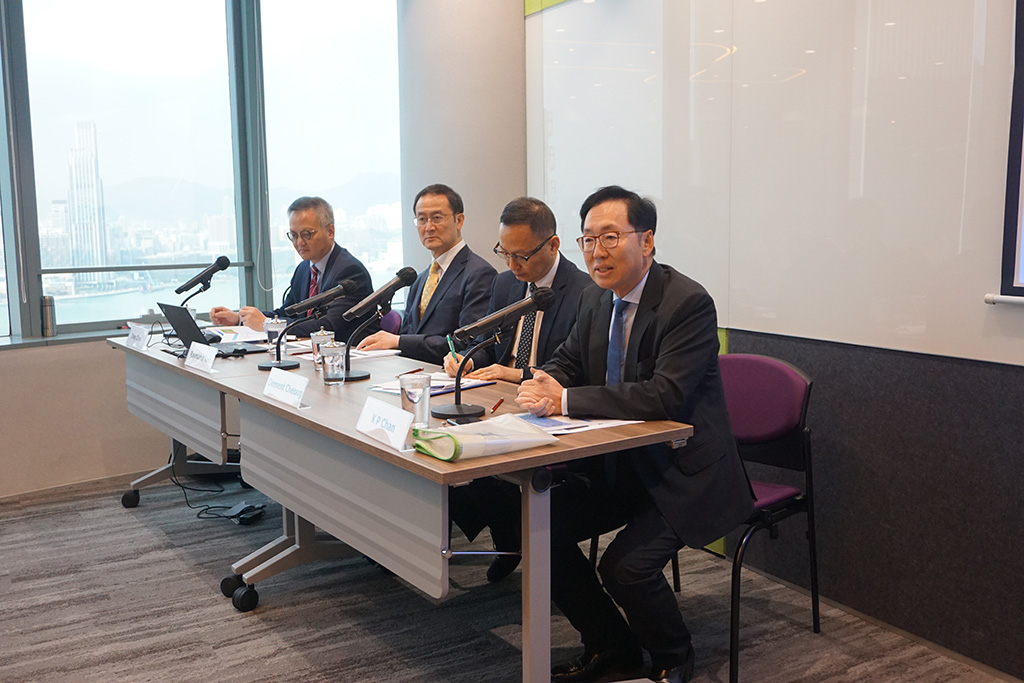Insurance
Successful launch of Voluntary Health Insurance Scheme
The Voluntary Health Insurance Scheme (VHIS) was officially launched in April 2019 after many years of effort. The VHIS has met with enthusiastic support from the public and by early 2020 over 300,000 policies had been sold. As early as 2005, the government had been studying how best to adequately fund healthcare for the public. I was fortunate to have participated in the preparatory work at every stage, during which there were many difficulties to overcome. Although the present scheme cannot be regarded as perfect, it finally saw the light of day after countless rounds of debate and negotiation. All things considered, I firmly believe the VHIS is a win-win case for residents, the insurance sector and the healthcare sector. With the roll out of the VHIS, I will continue to follow up on its implementation and seek further improvements.
Successful fight for tax deductions for deferred annuities
I have persistently advocated using insurance to help solve the problem of population ageing. My proposition was given support by the government and apart from launching the VHIS, it also rolled out a tax deduction scheme for annuity premiums and Mandatory Provident Fund (MPF) voluntary contributions after approval by the Legislative Council (Legco) in 2019. Originally the government set the tax deduction at HK$36,000 per annum. After my further representations, the government agreed to increase this sum to HK$60,000, which is much more attractive to taxpayers. Since its launch, the public has greatly

Attend Asian Insurance Forum 2018
welcomed this tax deduction scheme, with the insurance sector having already sold more than 90,000 deferred annuity policies worth up to HK$6.6 billion. Now I am seeking to increase the tax deduction amount to HK$120,000. It is because the present tax deduction of HK$60,000 is shared by both annuity premiums and MPF voluntary contributions which is not enough for middle-class taxpayers.
Calls for police to combat insurance fraud
Insurance fraud in Hong Kong has become rampant in recent years. The insurance sector and I have been working flat out putting pressure on the government to strengthen its crackdown on these crimes. During my present term of office, my work on combating fraud has continued. After much efforts on my part, in 2017, the Commercial Crime Bureau (CCB) agreed to expand the scope for investigation in insurance fraud. Apart from car insurance fraud, the police will now also investigate reports of employee insurance scams. The bureau will also handle cases of insurance fraud referred by the Hong Kong Federation of Insurers (HKFI).
Promoting the development of insurance technology
Developing insurance technology is the pathway for the insurance industry. Currently, this development is carried out mainly by the sector itself. In 2019, I introduced to the Financial Secretary two innovative technology research projects undertaken by the HKFI. The first project is the “Insurance Fraud Database” while the second project is the “Motor Insurance DLT-based Authentication System (MIDAS)”. These two projects make use of blockchain technology to authenticate motor insurance policies and prevent the policyholder from fraud when buying insurance. Funded entirely by the insurance industry itself, the projects aim to protect the interests of the public. The sector will continue to promote the development of insurance technology, and it is hoped that the government can offer support to these projects or provide financial assistance.
Calls to reduce compliance requirements for a business friendly environment
In recent years, the burden of compliance provisions has continued to increase. As a result, the operating environment for the insurance sector has changed from being flexible and efficient, to becoming rigid and sluggish. In 2019, I proposed to the government to study the approach of its rival Singapore: While complying with international requirements, it still maintains relaxing regulatory requirements. The Insurance Authority said it would follow up on the matter. Working with myself in the first half of 2020, the authority held two seminars for the insurance sector to explain progress made on compliance requirements. Such seminars were helpful for the insurance sector for preparation.
Implementation of the eMPF Platform and Continuing to defend the Mandatory Provident Fund
Currently the scale of operation of the MPF is still not mature enough. With constant market turmoil causing short-term returns to fluctuate wildly, the MPF has continually come under unreasonable attacks from its critics. In February 2019, several Legco members tabled a motion making many unreasonable criticisms against the MPF. I refuted these criticisms and pointed out that the MPF made an average annual return of up to 4.8 percent (after deducting administrative fees), outperforming inflation by a large margin and on par with the returns made by the Exchange Fund . The unreasonable motion was vetoed thus avoiding wrong signals being sent out to the public. In addition, in order to set up the MPF electronic centralized platform (the eMPF Centralized Platform), Legco had earlier approved funding of HK$4 billion for use by the Mandatory Provident Fund Schemes Authority in setting up the platform and to finance its initial operation. The platform is set for launch in 2022, aiming to boost automation in the administration of MPF schemes and thus reduce administrative costs.

Attend Insurance Forum 2021
Reflecting difficulties of the insurance sector during the coronavirus epidemic to the government
As a representative of the insurance sector, I have always paid great emphasis on the prosperity of the sector. Following the outbreak of the coronavirus epidemic in early 2020, coupled with the social unrest still continuing, the number of mainland visitors coming to Hong Kong to buy policies was reduced drastically. In January 2020, I demanded that the Financial Secretary provide assistance to the insurance sector. Later as the epidemic worsened, I enquired with insurance bodies and organisations about their situation and again demanded the government to extend assistance for the sector. In addition,
when the Legco Finance Committee was examining the Anti-Epidemic Fund in April, I again reflected the difficult situation of the sector to the Chief Secretary for Administration, and demanded the extending of measures for assisting self-employed insurance intermediaries. In June 2020, regarding the government’s extension of the 14-day compulsory quarantine for returnees to Hong Kong, I have received comments from the insurance sector and the public that the decision has severely affected their business and people’s livelihood. I immediately passed on these views to the Chief Executive and demanded the government launch the “health code” system. The scheme will help revive the flow of people and business between Guangdong province, Macau and Hong Kong, allowing mainlanders to come to Hong Kong to buy insurance policies.
Promoting Hong Kong as an international insurance centre
The insurance market in Hong Kong has saturated. If the sector is to develop further, it has to break into the international market. After many years of effort by the sector and myself, the Financial Secretary Paul Chan Mo-po promised to boost the competitiveness of Hong Kong as an insurance hub. Finally in June 2019, the government announced a raft of measures including proposals for profits tax concessions. Legco approved these concessions in July 2020 with the other measures to be gradually rolled out in due course.
Calls to break into the huge mainland market
Ever since the Central Government proposed the Guangdong-Hong Kong-Macao Greater Bay Area concept, the insurance sector and I have been calling for insurance to be directly sold in the mainland. The sector has come up with proposals such as “medical insurance connect” and “life insurance connect”. It is expected that the first proposal to be launched will be the “Insurance After Sales Service Centre” in the Greater Bay Area. In 2019, the Central Government announced the “Outline Development Plan for the Guangdong-Hong Kong-Macao Greater Bay Area” proposing multiple measures to develop the insurance sector. I will follow up on the implementation of these proposals and continue to fight for the permission of Hong Kong insurance companies to operate in the mainland.
Establishing the Insurance Academy for training insurance professionals
To enter the global market, the insurance sector in Hong Kong needs professionals who are well versed in international practices. In the past, local insurance companies focused on the local market. If the sector is to develop international business such as marine insurance, catastrophe insurance, and captive insurance, it will require a lot of professionals with international expertise. Following my repeated demands for provision of training to nurture such professionals, the government in 2016 launched the Pilot Programme to Enhance Talent Training for the Insurance Sector in which 4,000 practitioners have already taken part. As the programme has limitations, I have already requested the government establish an Insurance Academy for the comprehensive training of insurance professionals.
Promoting Hong Kong as an international marine insurance centre
With the government striving to develop Hong Kong’s maritime transportation, the insurance sector is pushing for Hong Kong to become an international marine insurance centre. In 2019, I explained the sector’s work on marine insurance to the Financial Secretary, while seeking his support and assistance regarding our vision.




